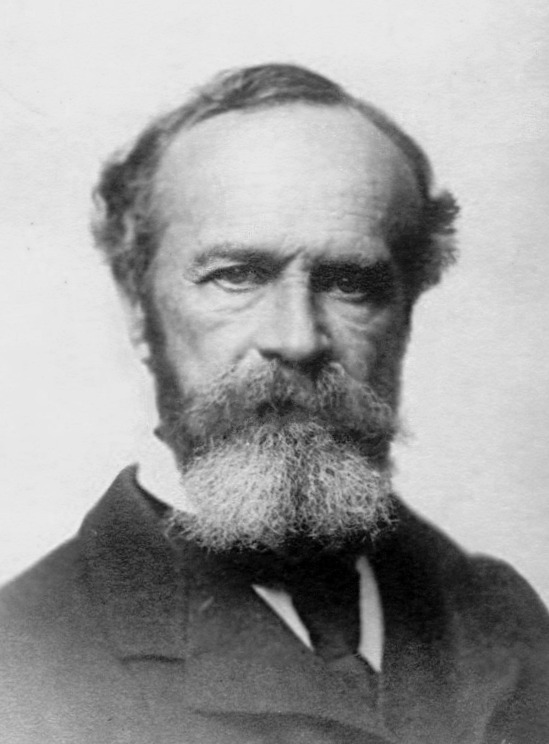|
Radical Empiricism
Radical empiricism is a philosophical doctrine put forth by William James. It asserts that experience includes both particulars and relations between those particulars, and that therefore both deserve a place in our explanations. In concrete terms: Any philosophical worldview is flawed if it stops at the physical level and fails to explain how meaning, values and intentionality can arise from that.William James, '' Essays in Radical Empiricism'', 1912, Essay II § 1. Radical empiricism Radical empiricism is a postulate, a statement of fact, and a conclusion, says James in ''The Meaning of Truth''. The postulate is that "the only things that shall be debatable among philosophers shall be things definable in terms drawn from experience." The fact is that our experience contains disconnected entities as well as various types of connections; it is full of meaning and values. The conclusion is that our worldview does not need "extraneous trans-empirical connective support, but posse ... [...More Info...] [...Related Items...] OR: [Wikipedia] [Google] [Baidu] |
Idealism
Idealism in philosophy, also known as philosophical realism or metaphysical idealism, is the set of metaphysics, metaphysical perspectives asserting that, most fundamentally, reality is equivalent to mind, Spirit (vital essence), spirit, or consciousness; that reality is entirely a mental construct; or that ideas are the highest type of reality or have the greatest claim to being considered "real".Goldschmidt et al. 2017, p. ix. Because there are different types of idealism, it is difficult to define the term uniformly. Indian philosophy contains some of the first defenses of idealism, such as in Vedanta and in Shaivism, Shaiva Pratyabhijna, Pratyabhijña thought. These systems of thought argue for an all-pervading consciousness as the true nature and ground of reality. Idealism is also found in some streams of Mahayana Buddhism, such as in the Yogachara, Yogācāra school, which argued for a "mind-only" (''cittamatra'') philosophy on an analysis of subjective experience. In ... [...More Info...] [...Related Items...] OR: [Wikipedia] [Google] [Baidu] |
Pragmatics
In linguistics and the philosophy of language, pragmatics is the study of how Context (linguistics), context contributes to meaning. The field of study evaluates how human language is utilized in social interactions, as well as the relationship between the interpreter and the interpreted. Linguists who specialize in pragmatics are called pragmaticians. The field has been represented since 1986 by the International Pragmatics Association (IPrA). Pragmatics encompasses phenomena including implicature, speech acts, relevance theory, relevance and Conversation analysis, conversation,Mey, Jacob L. (1993) ''Pragmatics: An Introduction''. Oxford: Blackwell (2nd ed. 2001). as well as nonverbal communication. Theories of pragmatics go hand-in-hand with theories of semantics, which studies aspects of meaning, and syntax, which examines sentence structures, principles, and relationships. The ability to understand another speaker's intended meaning is called ''pragmatic competence''. In 1938 ... [...More Info...] [...Related Items...] OR: [Wikipedia] [Google] [Baidu] |
Brian Massumi
Brian Massumi (; born 1956) is a Canadian philosopher and social theorist. Massumi's research spans the fields of art, architecture, cultural studies, political theory and philosophy. His work explores the intersection between power, perception, and creativity to develop an approach to thought and social action bridging the aesthetic and political domains. He is a retired professor in the Communications Department of the Université de Montréal. Overview Massumi was instrumental in introducing the work of French philosophers Gilles Deleuze and Félix Guattari to the English-speaking world through his translation of their key collaborative work '' A Thousand Plateaus'' (1987) and his book ''A User's Guide to Capitalism and Schizophrenia: Deviations from Deleuze and Guattari'' (1992). His 1995 essay "The Autonomy of Affect", later integrated into his most well-known work, ''Parables for the Virtual: Movement, Affect, Sensation'' (2002), is credited with playing a central role in t ... [...More Info...] [...Related Items...] OR: [Wikipedia] [Google] [Baidu] |
Alfred North Whitehead
Alfred North Whitehead (15 February 1861 – 30 December 1947) was an English mathematician and philosopher. He created the philosophical school known as process philosophy, which has been applied in a wide variety of disciplines, including ecology, theology, education, physics, biology, economics, and psychology. In his early career Whitehead wrote primarily on mathematics, logic, and physics. He wrote the three-volume ''Principia Mathematica'' (1910–1913), with his former student Bertrand Russell. ''Principia Mathematica'' is considered one of the twentieth century's most important works in mathematical logic, and placed 23rd in a list of the top 100 English-language nonfiction books of the twentieth century by Modern Library."The Modern Library ... [...More Info...] [...Related Items...] OR: [Wikipedia] [Google] [Baidu] |
Edwin Holt
Edwin Bissell Holt (; August 21, 1873 – January 25, 1946) was an American professor of philosophy and psychology at Harvard from 1901–1918. From 1926–1936, he was a visiting professor of psychology at Princeton University. Biography Holt was born in Winchester, Massachusetts. He graduated from Harvard in 1896 and received his Ph.D., also from Harvard, in 1901. His mentors at Harvard were William James, Hugo Münsterberg, and Josiah Royce. Holt retired from teaching at Harvard in 1918. Kuklick (1977) has suggested that Holt's retirement from Harvard was due to various causes. First, Holt shared William James' concerns and criticisms of academia, and resented the fact that academic life had by his time turned into a quest for personal glory and prestige, rather than an honest quest for knowledge. Second, members of his intellectual group of friends, which included Robert Yerkes, Herbert Langfeld, and Ralph Barton Perry, left Cambridge or withdrew for familial reasons. Hef ... [...More Info...] [...Related Items...] OR: [Wikipedia] [Google] [Baidu] |
John Dewey
John Dewey (; October 20, 1859 – June 1, 1952) was an American philosopher, psychologist, and Education reform, educational reformer. He was one of the most prominent American scholars in the first half of the twentieth century. The overriding theme of Dewey's works was his profound belief in democracy, be it in politics, education, or communication and journalism. As Dewey himself stated in 1888, while still at the University of Michigan, "Democracy and the one, ultimate, ethical ideal of humanity are to my mind synonymous." Dewey considered two fundamental elements—schools and civil society—to be major topics needing attention and reconstruction to encourage experimental intelligence and plurality. He asserted that complete democracy was to be obtained not just by extending voting rights but also by ensuring that there exists a fully formed public opinion, accomplished by communication among citizens, experts, and politicians. Dewey was one of the primary figures associ ... [...More Info...] [...Related Items...] OR: [Wikipedia] [Google] [Baidu] |
Reductionism
Reductionism is any of several related philosophical ideas regarding the associations between phenomena which can be described in terms of simpler or more fundamental phenomena. It is also described as an intellectual and philosophical position that interprets a complex system as the sum of its parts. Reductionism tends to focus on the small, predictable details of a system and is often associated with various philosophies like emergence, materialism, and determinism. Definitions ''The Oxford Companion to Philosophy'' suggests that reductionism is "one of the most used and abused terms in the philosophical lexicon" and suggests a three-part division: # Ontological reductionism: a belief that the whole of reality consists of a minimal number of parts. # Methodological reductionism: the scientific attempt to provide an explanation in terms of ever-smaller entities. # Theory reductionism: the suggestion that a newer theory does not replace or absorb an older one, but reduces it ... [...More Info...] [...Related Items...] OR: [Wikipedia] [Google] [Baidu] |
Phenomenology (philosophy)
Phenomenology is a philosophical study and movement largely associated with the early 20th century that seeks to Subjectivity_and_objectivity_(philosophy), objectively investigate the nature of subjective, consciousness, conscious experience. It attempts to describe the universal features of consciousness while avoiding assumptions about the external world, aiming to describe Phenomenon, phenomena as they appear, and to explore the meaning and significance of lived experience. This approach, while philosophical, has found many applications in qualitative research across different scientific disciplines, especially in the social sciences, humanities, Phenomenology (psychology), psychology, and cognitive science, but also in fields as diverse as health sciences, Phenomenology (architecture), architecture, and Human–computer interaction, human-computer interaction, among many others. The application of phenomenology in these fields aims to gain a deeper understanding of subjectiv ... [...More Info...] [...Related Items...] OR: [Wikipedia] [Google] [Baidu] |
Naturalism (philosophy)
In philosophy, naturalism is the idea that only Scientific law, natural laws and forces (as opposed to supernatural ones) operate in the universe. In its primary sense, it is also known as ontological naturalism, metaphysical naturalism, pure naturalism, philosophical naturalism and antisupernaturalism. "Ontological" refers to ontology, the philosophical study of what exists. Philosophers often treat naturalism as equivalent to materialism, but there are important distinctions between the philosophies. For example, philosopher Paul Kurtz argued that nature is best accounted for by reference to Matter, material principles. These principles include mass, energy, and other Physical property, physical and Chemical property, chemical properties accepted by the scientific community. Further, this sense of naturalism holds that spirits, Deity, deities, and ghosts are not real and that there is no "Teleology, purpose" in nature. This stronger formulation of naturalism is commonly ref ... [...More Info...] [...Related Items...] OR: [Wikipedia] [Google] [Baidu] |
Ralph Barton Perry
Ralph Barton Perry (July 3, 1876 – January 22, 1957) was an American philosopher. He was a strident moral idealist who stated in 1909 that, to him, idealism meant "to interpret life consistently with ethical, scientific, and metaphysical truth." Perry's viewpoints on religion stressed the notion that religious thinking possessed legitimacy should it exist within a framework accepting of human reason and social progress. Biography Ralph Barton Perry was born in Poultney, Vermont on July 3, 1876. He was educated at Princeton ( B.A., 1896) and at Harvard ( M.A., 1897; Ph.D., 1899), where, after teaching philosophy for three years at Williams and Smith colleges, he was instructor (1902–05), assistant professor (1905–13), full professor (1913–30) and Edgar Pierce Professor of Philosophy (1930–46). He was president of the American Philosophical Association's eastern division in 1920–21. He was elected to the American Academy of Arts and Sciences in 1928 and the Ameri ... [...More Info...] [...Related Items...] OR: [Wikipedia] [Google] [Baidu] |
William Pepperell Montague
William Pepperell Montague (11 November 1873 – 1 August 1953) was an American philosopher of the New Realist school. Montague stressed the difference between his philosophical peers as adherents of either "objective" and " critical realism". Montague was born in Chelsea, Massachusetts. He earned his bachelors, masters, and doctorate from Harvard University. He was professor of philosophy at UC Berkeley between 1899 and 1903, and at Columbia University from 1903 to 1947. He was president of the American Philosophical Association's eastern division in the years 1923–1924. He died in New York City. Montague was an advocate of panpsychism and proposed his own variant known as hylopsychism which developed the connection between energy and mind, contending that the physical manifestation of mind occurs as potential energy. Works"PROFESSOR ROYCE'S REFUTATION OF REALISM" ''Philosophical Review'' 11 (1902): 43–55. * Holt, Edwin B; Marvin, Walter T; Montague, William P; Perry, ... [...More Info...] [...Related Items...] OR: [Wikipedia] [Google] [Baidu] |






